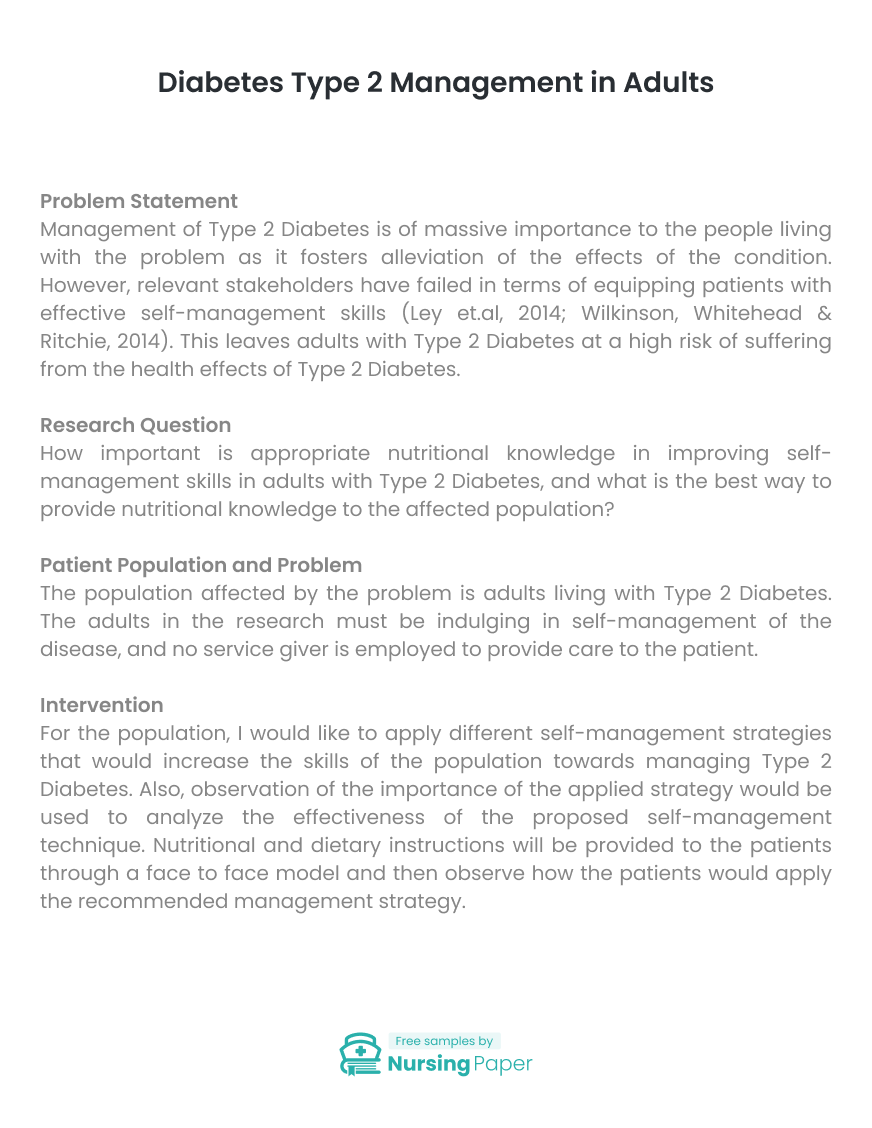
Diabetes Type 2 Management in Adults
Problem Statement
Management of Type 2 Diabetes is of massive importance to the people living with the problem as it fosters alleviation of the effects of the condition. However, relevant stakeholders have failed in terms of equipping patients with effective self-management skills (Ley et.al, 2014; Wilkinson, Whitehead & Ritchie, 2014). This leaves adults with Type 2 Diabetes at a high risk of suffering from the health effects of Type 2 Diabetes.
Research Question
How important is appropriate nutritional knowledge in improving self-management skills in adults with Type 2 Diabetes, and what is the best way to provide nutritional knowledge to the affected population?


Patient Population and Problem
The population affected by the problem is adults living with Type 2 Diabetes. The adults in the research must be indulging in self-management of the disease, and no service giver is employed to provide care to the patient.
Intervention
For the population, I would like to apply different self-management strategies that would increase the skills of the population towards managing Type 2 Diabetes. Also, observation of the importance of the applied strategy would be used to analyze the effectiveness of the proposed self-management technique. Nutritional and dietary instructions will be provided to the patients through a face to face model and then observe how the patients would apply the recommended management strategy.
Comparison
After observation, the population would receive educational instruction on how to develop nutritional plans that would help manage their conditions more effectively. This may also include using digitalized educational models such as education through computers and mobile phones (Pal et.al, 2014; Wilkinson, Whitehead & Ritchie, 2014).

Outcomes
Poor management of adults with Type 2 Diabetes increases the morbidity associated with high blood sugar (Miller at.al, 2013). Enabling adults living with the condition self-manage the disease, the morbidity rates would decrease significantly.
1. Ley, S., Hamdy, O., Mohan, V. & Hu, F. (2014). Prevention and Management of Type 2 Diabetes. Dietary Components and Nutritional Strategies. The Lancet, 383, (9933): 7-13.
2. Miller, C., Headings, H., Nagaraja, H. & Miller, C. (2013). Comparison of a Mindful Eating Intervention to a Diabetes Self-Management Intervention among Adults with Type 2 Diabetes. Health Education and Behavior, 41, (2): 145-154.
3. Pal, K., Eastwood, S., Michie, S., Farmer, A., Barnard, M., Richard, P., Woods, B., Edwards, P. & Murray, E. (2014). Computer Based Interventions to Improve Self-Management in Adults with Type 2 Diabetes: A Systematic Review and Meta-Analysis. Diabetes Care, 37, (6): 1759-1766.
4. Wilkinson, A., Whitehead, L. & Ritchie, L. (2014). Factors Influencing the Ability to Self-Manage Diabetes for Adults Living with Type 1 or 2 Diabetes. International Journal of Nursing Studies, 51, (1): 111-122.



The download will start shortly.

The download will start shortly.
 Subject:
Health and Social Care
Subject:
Health and Social Care  Number of pages: 11
Number of pages: 11  Subject:
Health and Social Care
Subject:
Health and Social Care  Number of pages: 4
Number of pages: 4  Subject:
Nursing
Subject:
Nursing  Number of pages: 4
Number of pages: 4  Subject:
Health and Social Care
Subject:
Health and Social Care  Number of pages: 3
Number of pages: 3  Subject:
Medicine
Subject:
Medicine  Number of pages: 1
Number of pages: 1  Subject:
Health and Social Care
Subject:
Health and Social Care  Number of pages: 2
Number of pages: 2  Subject:
Health and Social Care
Subject:
Health and Social Care  Number of pages: 4
Number of pages: 4  Subject:
Medicine
Subject:
Medicine  Number of pages: 4
Number of pages: 4  Subject:
Medicine
Subject:
Medicine  Number of pages: 5
Number of pages: 5  Subject:
Health and Social Care
Subject:
Health and Social Care  Number of pages: 5
Number of pages: 5  Subject:
Medicine
Subject:
Medicine  Number of pages: 5
Number of pages: 5  Subject:
Medicine
Subject:
Medicine  Number of pages: 4
Number of pages: 4  Subject:
Health and Social Care
Subject:
Health and Social Care  Number of pages: 5
Number of pages: 5  Subject:
Health and Social Care
Subject:
Health and Social Care  Number of pages: 19
Number of pages: 19  Subject:
Health and Social Care
Subject:
Health and Social Care  Number of pages: 4
Number of pages: 4 
